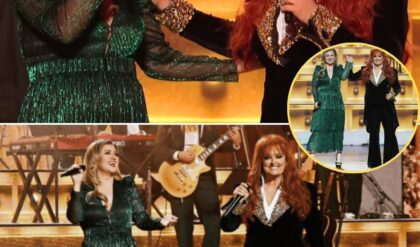
Rory Kinnear, The Lord of the Rings: The Rings of Power
Ross Ferguson/Prime Video
[Warning: The following contains spoilers for Season 2, Episode 4 of The Lord of the Rings: The Rings of Power.]
Tom Bombadil made his The Lord of the Rings: The Rings of Power debut this week, played by character actor Rory Kinnear in a voluminous beard and wig. Known for his role in The Fellowship of the Ring (notably cut from the Peter Jackson movie), Bombadil is enigmatic yet silly; a mythic figure who hints at ancient wisdom while living out his days as a jovial, eccentric hermit. And like his harfoot neighbors, Rory Kinnear’s version speaks with a strong regional accent, playing into a recurring problem throughout the show.
Tolkien’s linguistic worldbuilding is famously sophisticated, and The Rings of Power puts a lot of work into its use of constructed languages like Quenya. Unfortunately its English-language choices are nowhere near as thoughtful, embracing clumsy stereotypes from around the British Isles. The most uncomfortable example is the nomadic harfoot community in Season 1; they’re the only characters who speak with Irish accents.
Writing in The Irish Times, critic Ed Powers described these “twee and guileless” harfoots as “a race of simpleton proto-hobbits, rosy of cheek, slathered in muck, wearing twigs in their hair and speaking in stage-Irish accents that make the cast of Wild Mountain Thyme sound like Daniel Day-Lewis.” He made the convincing argument that they reflect offensive images of Irish culture as “pre-industrial and childlike.” Unfortunately the show’s accent problems don’t stop there.
Overseen by American showrunners, the accent choices in The Rings of Power are deeply rooted in unexamined classism and regional stereotypes. By and large, the characters who receive serious, dramatic storylines (Sauron, the elves, the human leaders of Númenor) speak with a neutral, implicitly upper-class “Received Pronunciation” (RP) English accent. By contrast, the characters in more comedic, quirky, or subservient roles (the harfoots, the dwarves, the orcs) speak with regional and/or working-class accents. We don’t see characters with RP accents in goofy slapstick roles, and no one with a cockney accent gets to be charismatic, impressive, or clever.
Tom Bombadil and Season 2’s desert harfoots (also known as the Stoors) echo the vocal patterns of Southwest England, with Rory Kinnear choosing a Cornish accent because he sees Cornwall as “the oldest part of Britain,” tying into Bombadil’s quasi-immortal role. Fine! Perfectly reasonable. Likewise there’s a logical argument for isolated harfoot settlements to have distinctive local dialects. However in the show’s wider context, these accent choices arrive with unavoidable baggage.
Throughout British pop culture, this style of Southwest accent is routinely employed as a shorthand for bumbling country yokels — an archetype that immediately makes itself known with the first new harfoot we meet, a wild-haired young man called Nobody. Much like Nori’s tribe, his brethren are depicted as simple rustic folk, and their scenes often play out in a light and humorous tone. Meanwhile the local Dark Wizard (Ciarán Hinds) and his followers have RP accents, enveloped by a dark and dramatic atmosphere.

Megan Richards and Markella Kavenagh, The Lord of the Rings: The Rings of Power
Ross Ferguson/Prime Video
The class divide here will feel very familiar if you’ve seen a traditional British Shakespeare production, where working-class characters with regional accents (e.g. the “rude mechanicals” in A Midsummer Night’s Dream) play broad comic relief alongside an aristocratic main cast. To a certain extent this is how Peter Jackson adapted Merry and Pippin in The Lord of the Rings, but the harfoots go considerably further in The Rings of Power, overshooting Tolkien’s more affectionate attitude toward the hobbits.
Tolkien strongly identified with the hobbits himself, celebrating them as an idealized image of English rural life: a low-stress existence of good food and close-knit communities. Their lifestyles and outlooks are less ambitious than that of elves or men, but that isn’t necessarily a bad thing. In fact, this simplicity of spirit is why Frodo and Sam are chosen to take the One Ring to Mordor.
But in The Rings of Power, the intellectual gulf between harfoots and other races is absurdly exaggerated. Nori’s harfoot tribe generally seem stupid, close-minded, and ridiculous, and their actors perform in a completely different register to the lofty drama of the elves. I also couldn’t help but notice that while Nori’s amnesiac wizard friend initially learns to speak with an Irish harfoot accent, he switches to Received Pronunciation once he regains his magic. Another reminder of the connection between upper-class elocution and power.
Other accent choices play into similarly distasteful stereotypes. For instance, the orcs — a rabble of ugly, unintelligent, amoral monsters — sound cockney, a working-class accent often associated onscreen with petty crime. In historical dramas and fantasy media, you’ll struggle to find a single sympathetic protagonist with this accent, fueling negative biases in real life.
Down in the kingdom of Khazad-dûm, the short-tempered and blusterous dwarves sound unmistakably Scottish. And although their royal conflicts have a major impact on Middle-earth’s politics — and include some moments of real pathos this season — their broad characterization often doubles as comic relief.
As for the humans, The Rings of Power gives the Southlanders (including Sauron’s Halbrand persona) a Northern English accent, contrasting with the wealthy and posh-sounding Númenoreans. Game of Thrones fans will recognize this North/South divide from the salt-of-the-earth Starks versus the snobbish Lannisters. Once again we return to vintage stereotypes, where Northern-accented characters may receive serious storylines (Estrid; Bronwyn), but are usually typecast as lower-class. We don’t hear accents like this from powerful characters like the solemn Gil-galad or the cunning Pharazôn, and after Sauron gets his Annatar makeover this season, he immediately switches to Received Pronunciation.
The problem here isn’t the mere existence of an accent-based class system in Middle-earth. It’s how that class system plays into the narrative. Which characters are taken seriously within the text? Who receives the complex political arcs and psychological conflicts? Who is portrayed as educated and impressive, and whose behavior is treated as a punchline?
In Season 2, the most impactful storylines revolve around Sauron and Celebrimbor, Adar, Galadriel, Elrond, and the rules of Khazad-dûm and Númenor. Aside from the dwarves, these characters all sound like they belong to England’s ruling class. Meanwhile the regional or lower-class characters play lower-stakes roles or simply receive less screentime, lacking the complexity of leaders like Celebrimbor or Adar.
Behind the scenes, this linguistic worldbuilding means that very few of the main cast get to use their natural accents. Owain Arthur (Durin IV) and Morfydd Clark (Galadriel) are both Welsh, playing characters who sound Scottish and English. Charlie Vickers (Sauron) and Markella Kavenagh (Nori) are Australian. Benjamin Walker (Gil-galad) and Cynthia Addai-Robinson (Queen Míriel) are American, and Ismael Cruz Córdova (Arondir) is Puerto Rican. For one reason or another, their original accents were considered a bad fit for Middle-earth.

Robert Aramayo, The Lord of the Rings: The Rings of Power
Ross Ferguson/Prime Video
One of the most telling examples of this situation is Robert Aramayo, who plays Elrond. Born and raised in Yorkshire, he has a noticeable accent in real life. But apparently elves can’t come from Yorkshire, so he adopts RP for the show. When we hear Northern accents elsewhere in Middle-earth, they generally emerge from unwashed peasants in secondary roles.
The underlying question here is, of course, why these decisions were made. Why do all the elves sound like third-generation Oxford graduates and BBC newsreaders? Why can’t Ismael Cruz Córdova and Robert Aramayo use their normal voices, reflecting the diversity of elvish culture? Why are Númenoreans also English, when their city’s architecture and fashion draws inspiration from Venice, Rome, and the ancient Middle East? Why must the orcs and harfoots reflect so many insulting stereotypes? Why can’t Gil-galad or Isildur be Irish? If your mind rebels against these questions, it’s time to examine why.
Considering Tolkien’s background, there’s a straightforward argument for Middle-earth to sound like the British Isles. Tolkien’s storytelling is also undeniably invested in class and monarchy. Overlapping with the archetypes he popularized for fantasy races like elves and orcs, this worldbuilding forms the backbone for decades of fantasy media. Yet it’s also a major stumbling block in the journey to modernize and diversify Tolkien’s work. Racism and classism are baked into the original lore.
When adapting this material for the screen, The Rings of Power faced an unspoken decision: Take the lazy and predictable route when mapping Middle-earth’s accents, or try to shake things up. The show’s creative team chose the first option. As a result, this version of Middle-earth is riddled with tired old stereotypes, relying on accent choices that sound clichéd at best, and offensive at worst. Despite the criticism leveled at the Irish harfoots last season, there’s no sign of that changing.





